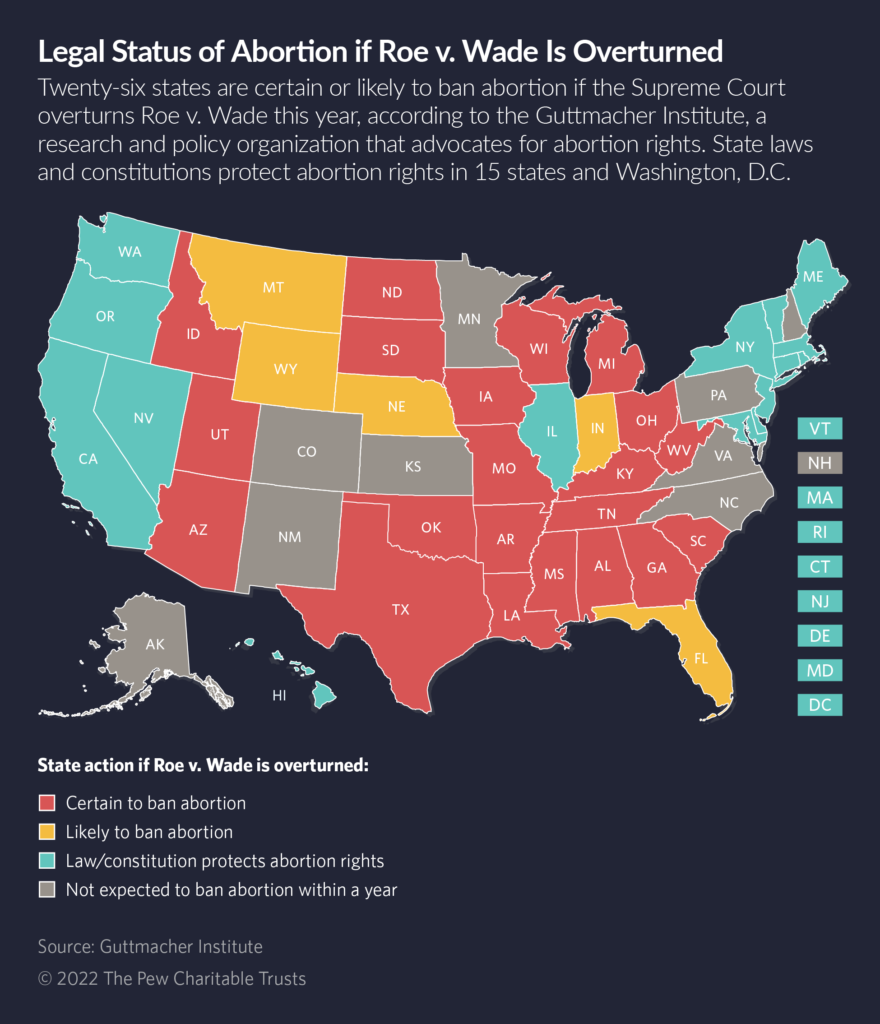By Christine Vestal
Staff Writer, Stateline
As the nation awaits a U.S. Supreme Court ruling that could significantly erode abortion rights, state laws on the issue have taken on a whole new meaning. Soon, more than at any time in nearly half a century, obtaining an abortion will depend on where you live.

In 1973, the high court guaranteed the right to abortion everywhere in its landmark Roe v. Wade decision. That ruling made state abortion bans largely symbolic, and federal courts routinely invalidated them.
In many cases, the strictest laws represented political posturing without the risk of a public backlash because the statutes never took effect, said David Karol, an associate professor of government and politics at the University of Maryland.
Likewise, state laws protecting the right to abortion if Roe were to fall have been considered theoretical for much of the past nearly 50 years. That era has ended, he said.
This year the stakes are at an all-time high.
“Abortion-rights advocates have worried about Roe for a long time, but certainly from the moment [abortion rights supporter Justice Anthony] Kennedy resigned in July 2018,” said Jessica Arons, senior advocacy and policy counsel for reproductive freedom at the American Civil Liberties Union. “That’s when we knew this was the future we were facing.”
In what would be its most significant abortion ruling in three decades, the Supreme Court is considered likely to weaken or topple Roe this year. That would mean that abortion bans on the books in at least 21 states could be enforced, according to abortion advocacy and research group the Guttmacher Institute.
The abortion-rights group also predicts that given the political climate in at least five other states—Florida, Indiana, Montana, Nebraska and Wyoming—new bans are likely to be enacted that would immediately have the force of law.
In addition, Kansas and Pennsylvania are possibly an election away from banning abortion, Arons said. “But for judicial precedent supporting abortion rights in state supreme courts, they also would be inclined to ban abortion.”
On the other side of the issue, residents in 15 states and the District of Columbia are insulated against future bans. New Jersey earlier this month joined California, Connecticut, Delaware, the District of Columbia, Hawaii, Illinois, Maine, Maryland, Massachusetts, Nevada, New York, Oregon, Rhode Island, Vermont and Washington in encoding the right to abortion in state statutes.
Anticipated in June or July, after most legislatures close and before elections for some governors and state lawmakers, the high court’s ruling in Dobbs v. Jackson Women’s Health is widely expected to uphold a Mississippi law that bans abortion after 15 weeks of pregnancy.
Roe v. Wade and a 1992 decision, Planned Parenthood v. Casey, guarantee the right to abortion until a fetus is considered viable outside of the womb, at roughly 26 weeks of pregnancy. Abortions after viability also are allowed to protect the life of the patient.
STATELINE STORY: Trump-Appointed Judges Fuel Abortion Debate in the States
In this year’s legislative sessions, the challenge for state lawmakers on both sides of the abortion issue will be to set the stage for a future in which bans on early-pregnancy abortions may become enforceable, possibly resulting in zero access to a legal abortion in many states.
The precise outcome of the high court’s pending decision in the Mississippi case is unknown. But based on comments from justices in oral arguments held in December, legal experts agree that a majority of the justices are likely to uphold the Mississippi law. It’s unclear whether such a decision would erode or overturn Roe.
“Either way,” Karol said, “states will have much more leeway than they do now to restrict abortion.”
A Busy Season
Every year since Roe was decided, state legislatures have enacted dozens of laws banning or restricting abortion access. A smaller number of states have enshrined the right to abortion in their state laws and constitutions.
“This year, we expect lawmakers will be even busier than they were in 2021, both in states that are hostile to abortion rights and those that have been historically supportive of abortion rights,” said Elisabeth Smith, director for state policy and advocacy at the Center for Reproductive Rights, a legal advocacy group.
Clarke Forsythe, senior legal counsel at Americans United for Life, which opposes abortion rights, agreed that state legislatures likely will pass a flurry of bills both for and against abortion rights, despite uncertainty in the months ahead over the outcome of the Mississippi case.
While courts have consistently shut down abortion bans, they have upheld state restrictions on health care facilities that provide abortions, mandates that doctors provide patients scripted details about the fetus and the procedure, prohibitions against Medicaid funding and laws requiring parental notification or consent.
Those policies have chipped away at the rights guaranteed by Roe in many states, said Jessie Ulibarri, co-executive director of State Innovation Exchange, which assists liberal lawmakers in crafting policies on abortion and other issues. Those most harmed by restrictive abortion laws, he said, are low-income people and women of color.
Already, state abortion restrictions have had the effect of sharply limiting access to abortion in large swaths of the country. As of 2017, Kentucky, Mississippi, North Dakota, South Dakota and West Virginia each had only one abortion provider.
But if the court erases or significantly erodes Roe, most states in the South and much of the Midwest likely would end up with no abortion clinics. That would force many seeking abortions to travel out of state—and to find the money and possibly child care to enable them to do so.
STATELINE STORY: New Laws Deepen State Differences Over Abortion
Even medication abortions, which can be used to end a pregnancy up to 10 weeks of gestation, could become harder to come by. Anti-abortion rights advocate Forsythe said his organization is pushing states to enact laws that would limit the use of abortion pills mifepristone and misoprostol by requiring patients to see a doctor before obtaining the pills and follow up afterward to ensure there are no complications.
GOP lawmakers in Georgia, for example, introduced a bill this week that would ban the delivery of abortion pills by mail and require patients to visit a doctor, receive a physical exam and sign 15 different statements before returning to the doctor to pick up the medication.
The U.S. Food and Drug Administration said in December that it will permanently allow abortion pills to be sent by mail after a telemedicine visit.
In addition, a variety of nonprofit organizations are helping patients find and pay for abortion pills online. In 2017, medication abortions accounted for 39% of all abortions, according to Guttmacher.
Turbulence Ahead
In 2021, states enacted at least 106 laws restricting abortion access, more than in any year since the Roe decision.
Among states with early-pregnancy abortion bans that likely would take effect if the high court overturns Roe, several enacted even stricter bans last year. More are expected this year.
In South Dakota, for example, Republican Gov. Kristi Noem announced Jan. 11 that she would push for a ban on abortion after six weeks of pregnancy, when most people don’t know they’re pregnant. That’s in addition to a so-called trigger or conditional law already on the state’s books that would make most abortions illegal if Roe is overturned.
Noem’s proposed bill is patterned after a controversial law enacted in Texas last year that the Supreme Court has allowed to stay in force while lower courts decide its fate. GOP lawmakers have introduced similar legislation in Alabama, Arizona, Missouri and Ohio, and an Oklahoma representative has said he plans to do the same this session.
STATELINE STORY: Citizen Enforcement of Texas Abortion Ban Could Spread to Other Laws
In a handful of Republican-led states that don’t already have statutes banning abortions, lawmakers and governors are expected to enact new bans.
In Florida, for example, GOP lawmakers in both houses of the legislature introduced a billthat would ban abortion after 15 weeks unless two doctors agree a fetus has a fatal abnormality. The bill, which is expected to pass in both houses, has no exceptions for rape or incest.
In Kansas and Pennsylvania, where the governors are Democrats but the legislatures are led by Republicans, constitutional amendments to remove abortion rights protections are in progress.
An initiative will be on the ballot in the August primary elections in Kansas.
In Pennsylvania, a similar measure has been introduced. But under state rules, the legislature would have to approve the measure a second time next year before it could go on the ballot. Democratic Gov. Tom Wolf has said he would veto any anti-abortion rights legislation, but Republicans are pushing a bill that would amend the constitution without the governor’s signature.
In sharp contrast, California and possibly other states are looking beyond their own borders with the goal of making it easier for patients in neighboring states to obtain legal abortions in their states.
Political scientist Karol argues that rather than settling the issue or calming the abortion debate, a high court decision giving states more latitude would deepen divisions both within and among them.
A broader decision overturning Roe would stir even more debate at the state level and could renew efforts to pass a federal abortion rights law, Karol said. In September, U.S. House Democrats passed a bill to protect abortion rights, but it faces stiff opposition from Senate Republicans.
A federal law would be impossible for Congress to enact because of the filibuster rule, Karol said, but hearings on the issue could raise the specter of abortion becoming a major political issue in the November elections.
Stateline, an initiative of The Pew Charitable Trusts.


